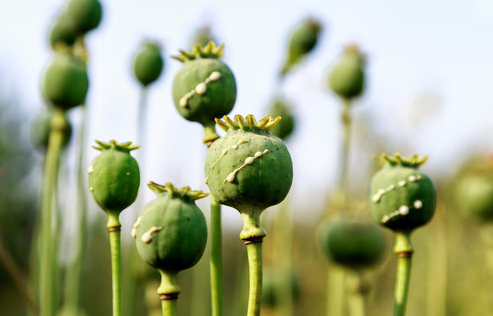ForumIAS announcing GS Foundation Program for UPSC CSE 2025-26 from 19 April. Click Here for more information.
ForumIAS Answer Writing Focus Group (AWFG) for Mains 2024 commencing from 24th June 2024. The Entrance Test for the program will be held on 28th April 2024 at 9 AM. To know more about the program visit: https://forumias.com/blog/awfg2024
What is the News?
The Union government has decided to bring in the private sector in the production of poppy straw from opium production.
This move is expected to boost the yield of alkaloids which are used for medical purposes and exported to several countries.
Opium Production in India:
- India is one of the few countries that grow opium legally. It currently only extracts alkaloids from opium gum at few facilities. The Revenue Department in the Finance Ministry controls these facilities.
- This is done by using the poppy straw method. Under this, the farmers extract gum by manually cutting the opium pods and selling the gum to government factories.
Note: Alkaloids are a huge group of naturally occurring organic compounds that contain nitrogen atom or atoms (amino or amido in some cases) in their structures. This includes morphine, strychnine, quinine, ephedrine, and nicotine.
- This is done by using the poppy straw method. Under this, the farmers extract gum by manually cutting the opium pods and selling the gum to government factories.
- However, India’s opium production has been declining over the years. It is depending heavily on imports. Especially to meet the need for Poppyseed for edible purposes and codeine (extracted from opium) for medicinal uses.
Codeine is the methyl ether derivative of morphine found in the opium poppy - Hence, the government decided to adopt the public-private partnership(PPP). Under this, the government will switch to new technologies after trial cultivation by two private firms showed higher extraction of alkaloids using the Concentrated Poppy Straw(CPS).
- CPS is a mechanised system under which the entire harvest will be cut by machine and transferred to government factories.
Issues in bringing Private Sector in Opium Production:
- The government will need to amend the Narcotic Drugs and Psychotropic Substances (NDPS) Act,1985 to bring in the private players in opium production.
- Hence, the government has appointed a consultant to help frame an appropriate public-private partnership(PPP) model. It will advise on the changes needed to the rules and laws to facilitate the process. Further, it will also recommend security measures to protect the crop and the final product.
About Opium:
- Firstly, Opium is dried latex obtained from the seed capsules of the opium poppy Papaver somniferum.
- Secondly, India is one among 12 countries in the world where legal cultivation of opium is permissible. It is permissible within the ambit of the United Nations, Single Convention on Narcotic Drugs 1961.
- Thirdly, Uttar Pradesh, Rajasthan, and Madhya Pradesh are the three traditional opium-growing States. In those states, poppy cultivation is allowed based on licences issued annually by the Central Bureau of Narcotics.
About Poppy Straw:
- Poppy Straw is the husk left after the opium is extracted from pods. They are used in the commercial manufacture of morphine or other poppy alkaloid derived drugs.
- Poppy straw is one of the narcotic drugs under the NDPS Act, 1985. Hence, anyone who possesses, selling, purchasing, or using poppy straw without a license or authorization is liable to prosecution under the NDPS Act.
- Further, the Possession, sale, use of poppy straw is regulated by the State Governments under the State NDPS Rules.
- Farmers sell the poppy straw to those licensed by the State Governments to purchase poppy straw. Any excess poppy straw is ploughed back into the field.
Source: The Hindu





